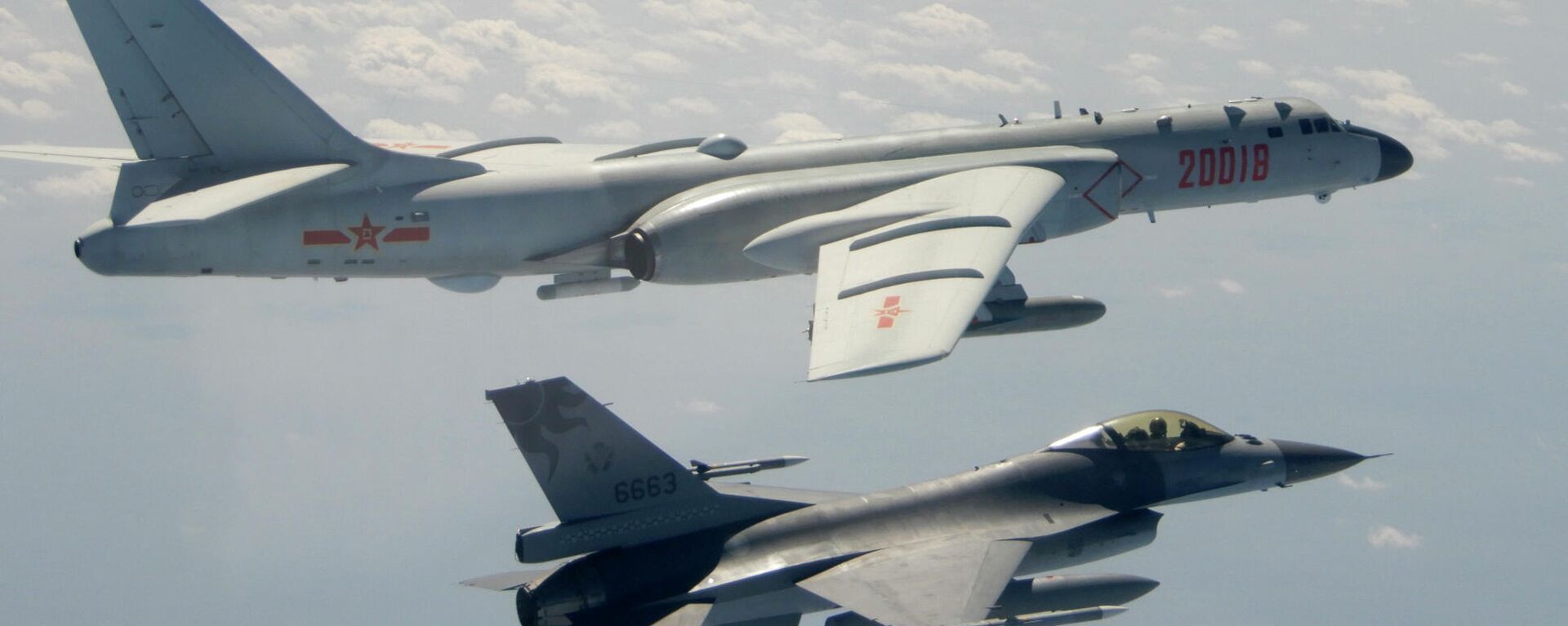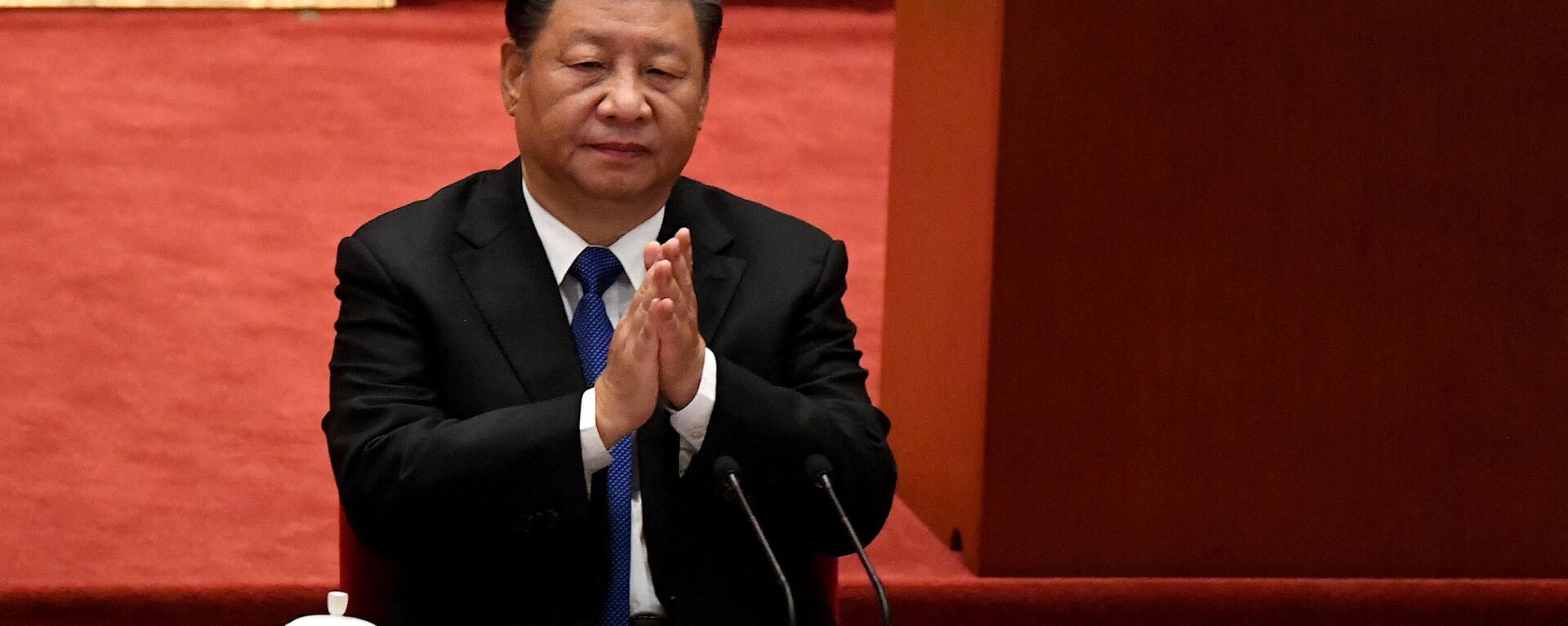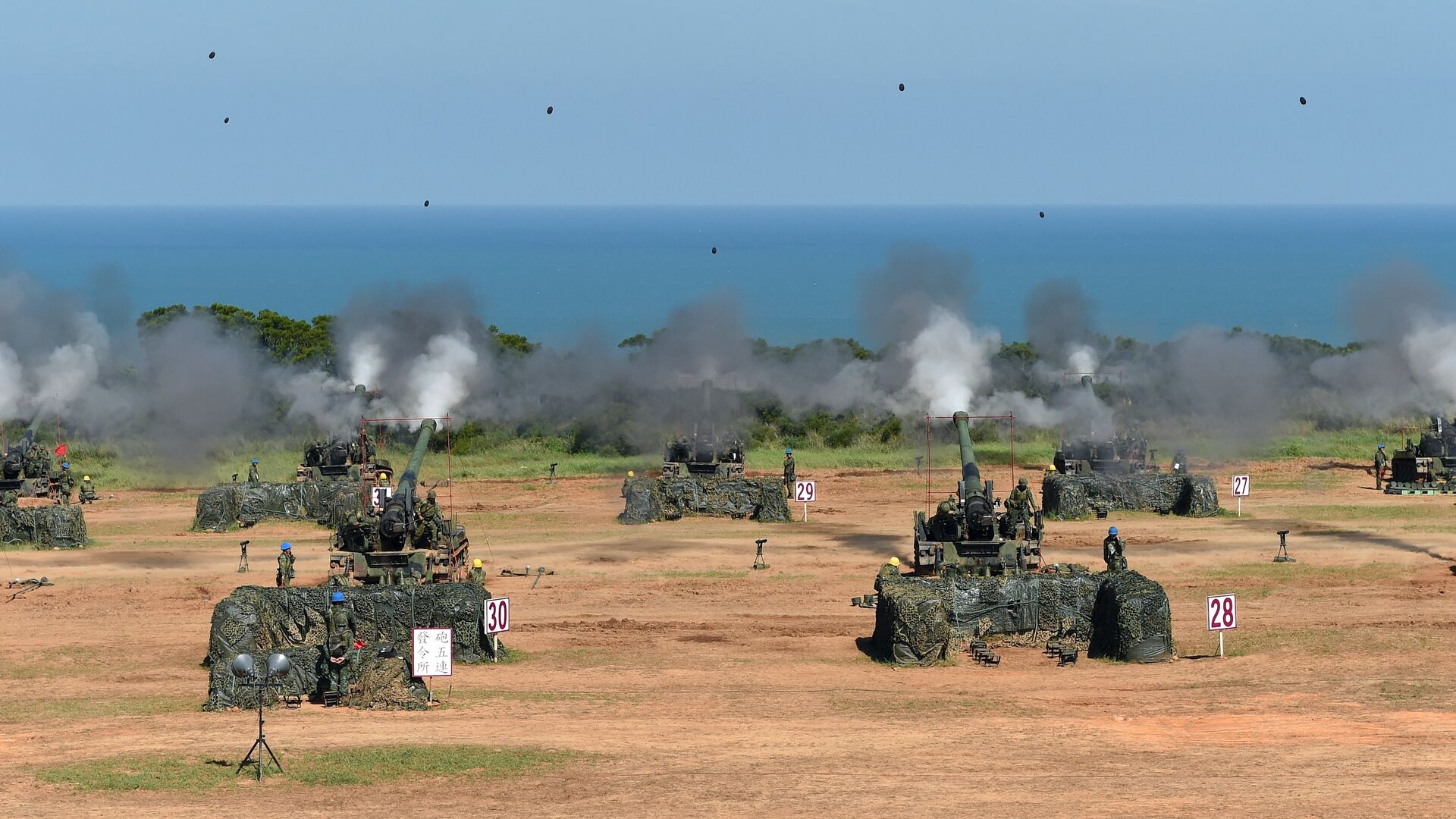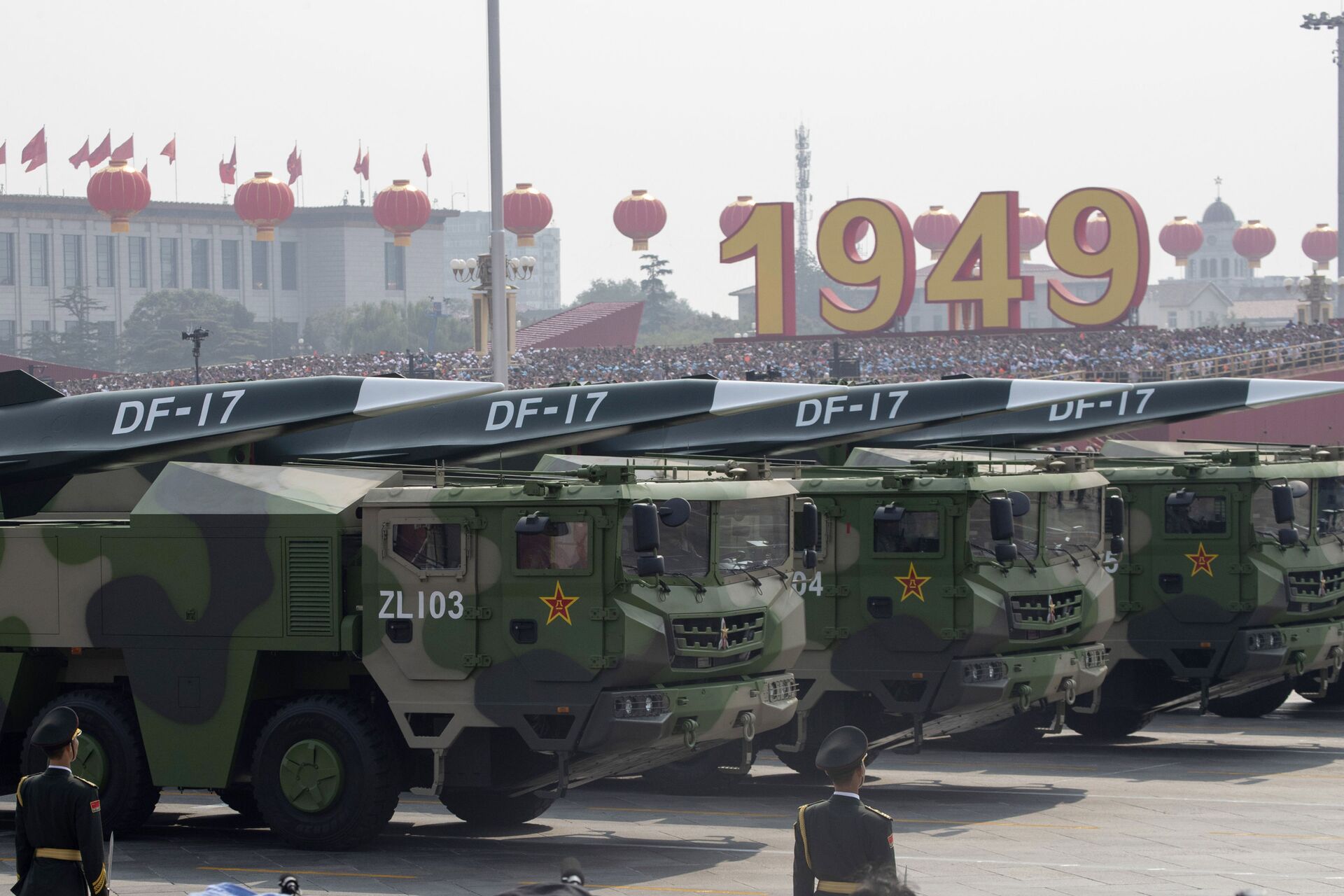https://sputnikglobe.com/20211030/us-media-acknowledges-ugly-reality-that-america-could-lose-war-with-china-over-taiwan-1090349874.html
US Media Acknowledges ‘Ugly Reality’ That America Could Lose War With China Over Taiwan
US Media Acknowledges ‘Ugly Reality’ That America Could Lose War With China Over Taiwan
Sputnik International
Tensions between the US and China over Taiwan, already heightened under Donald Trump thanks to US "freedom of navigation" patrols through the Taiwan Strait and... 30.10.2021, Sputnik International
2021-10-30T18:14+0000
2021-10-30T18:14+0000
2023-06-19T12:43+0000
america
china
taiwan
https://cdn1.img.sputnikglobe.com/img/104115/35/1041153584_442:0:4015:2010_1920x0_80_0_0_389b7b87bc267a646dcd4468bc9ba88d.jpg
The United States must come to terms with the reality that it no longer enjoys “military primacy” in the Western Pacific, and confront the “ugly” reality that it may lose a military conflict with China over Taiwan, Graham Allison, professor of government at the Harvard Kennedy School, has warned.In a piece for The National Interest, Allison pointed to recent analyses on the possibility of war over Taiwan by a number of senior current and former officials, including ex-Vice Joint Chiefs Chairman James Winnefeld and former-CIA Director Michael Morell, who recently concluded that the Chinese military could deliver a fait accompli on Taiwan before Washington even mustered its forces.Col. Bob Work, former deputy secretary of defence under Barack Obama and Joe Biden, has expressed even greater pessimism, stating publicly (Allison’s paraphrasing) that “in the most realistic war games the Pentagon has been able to design simulating war over Taiwan, the score is eighteen to zero. And the eighteen is not Team USA.”The reasons for this are twofold, according to Allison. The first, as former Secretary of Defence Jim Mattis said in his 2018 National Defence Strategy, is that the US no longer enjoys its post-Cold War “dominant superiority in every operating domain,” including the ability to “generally deploy our forces when we wanted, assemble them where we wanted, and operate how we wanted. Today, every domain is contested – air, land, sea, space and cyberspace.”The second, Allison notes, relates to China’s radical advances in its anti-access/area-denial (A2/AD) capabilities – consisting of everything from anti-ship and anti-air missile systems to long range ballistic and cruise missiles, electronic warfare and interceptor aircraft.Allison stressed that “the reason for confronting ugly realities is not to counsel defeatism,” and argued that there are “many things” Taiwan could do to beef up its security, such as surrounding the island with smart mines. The US too could use “asymmetric systems” to “raise the costs and risks” of a Chinese attack on Taiwan.However, the best thing Washington could do, according to the scholar, is to strive to create a diplomatic solution akin to Richard Nixon and Jimmy Carter’s 1970s policy of strategic ambiguity vis-à-vis Taiwan. “In this grave new world, the most urgent and consequential international challenge for President Biden and his team is to craft a twenty-first-century analogue that will extend this peace for another half-century,” Allison concluded.Cross-Strait TensionsAllison’s warning comes amid the continued heating up of tensions between Beijing and Washington over Taiwan.Earlier this week, Taiwanese President Tsai Ing-wen publicly acknowledged the presence of US troops on Taiwanese territory for training purposes, confirming earlier media reporting that a “small number” of US forces had been present on the island for over a year – in direct violation of US-China agreements signed when diplomatic relations between the two countries were established.Last week, US President Joe Biden told a CNN town hall that the US has a “commitment” to defend Taiwan, and warned US adversaries not to “make a serious mistake,” while boasting that America possesses “the most powerful military in the history of the world.”Beijing blasted Biden over the remarks, reiterating that Taiwan is “an inalienable part of China’s territory,” and warning that China was ready to go to war to prevent the loss of the island.Earlier this month, Chinese President Xi Jinping pledged that the reunification of Taiwan with China would “definitely” take place, stressing that “to achieve the reunification of the motherland by peaceful means” was “most in line with the overall interests of the Chinese nation, including our compatriots in Taiwan.”Taiwan, which officially calls itself the ‘Republic of China’, broke off from the mainland in 1949 following the communist victory in the Chinese Civil War. The two ‘Chinas’ spent decades bickering over which of them was the one true China. The United Nations recognised the PRC as the only legal China in 1971, and the United States agreed to recognise the People’s Republic as such in 1979.In the 1980s and 1990s, Taiwan’s longtime ruling party – the nationalist Kuomintang, the same political force which fought the communists in the civil war, worked to improve relations with the PRC, establishing economic ties and strengthening informal diplomatic links. The Kuomintang have expressed agreement with the idea of eventual peaceful reunification with the mainland under the ‘One Country, Two Systems’ principle. However, since coming to power in 2016, Tsai’s Democratic Progressive Party has expressed hostility to the idea of reunification, and lobbied the US intensely to try to shore up diplomatic and military ties.
https://sputnikglobe.com/20211028/taiwans-president-admits-us-military-training-taiwanese-soldiers-amid-growing-chinese-threat-1090272302.html
https://sputnikglobe.com/20211009/chinas-reunification-with-taiwan-will-definitely-be-fulfilled-xi-jinping-says-as-tensions-grow-1089788152.html
china
taiwan
Sputnik International
feedback@sputniknews.com
+74956456601
MIA „Rosiya Segodnya“
2021
News
en_EN
Sputnik International
feedback@sputniknews.com
+74956456601
MIA „Rosiya Segodnya“
Sputnik International
feedback@sputniknews.com
+74956456601
MIA „Rosiya Segodnya“
america, china, taiwan
US Media Acknowledges ‘Ugly Reality’ That America Could Lose War With China Over Taiwan
18:14 GMT 30.10.2021 (Updated: 12:43 GMT 19.06.2023) Tensions between the US and China over Taiwan, already heightened under Donald Trump thanks to US "freedom of navigation" patrols through the Taiwan Strait and arms sales to Taipei, have escalated to new highs under Joe Biden over the president’s promises to “defend” the island, and media revelations that US troops are already stationed there.
The United States must come to terms with the reality that it no longer enjoys “military primacy” in the Western Pacific, and confront the “ugly” reality that it may lose a military conflict with China over Taiwan, Graham Allison, professor of government at the Harvard Kennedy School, has warned.
In a
piece for The National Interest, Allison pointed to recent analyses on the possibility of war over Taiwan by a number of senior current and former officials, including ex-Vice Joint Chiefs Chairman James Winnefeld and former-CIA Director Michael Morell, who recently
concluded that the Chinese military could deliver a fait accompli on Taiwan before Washington even mustered its forces.
Col. Bob Work, former deputy secretary of defence under Barack Obama and Joe Biden, has expressed even greater pessimism,
stating publicly (Allison’s paraphrasing) that “in the most realistic war games the Pentagon has been able to design simulating war over Taiwan, the score is eighteen to zero. And the eighteen is not Team USA.”
The reasons for this are twofold, according to Allison. The first, as former Secretary of Defence Jim Mattis said in his 2018 National Defence Strategy, is that the US no longer enjoys its post-Cold War “dominant superiority in every operating domain,” including the ability to “generally deploy our forces when we wanted, assemble them where we wanted, and operate how we wanted. Today, every domain is contested – air, land, sea, space and cyberspace.”
The second, Allison notes, relates to China’s radical advances in its anti-access/area-denial (A2/AD) capabilities – consisting of everything from anti-ship and anti-air missile systems to long range ballistic and cruise missiles, electronic warfare and interceptor aircraft.
“In 2000, A2/AD systems by which China could prevent US military forces from operating at will – was just a People’s Liberation Army (PLA) acronym on a briefing chart. Today, China’s A2/AD operational reach encompasses the First Island Chain, including Taiwan and Japan’s Ryukyu Islands,” the scholar wrote.
Allison stressed that “the reason for confronting ugly realities is not to counsel defeatism,” and argued that there are “many things” Taiwan could do to beef up its security, such as surrounding the island with smart mines. The US too could use “asymmetric systems” to “raise the costs and risks” of a Chinese attack on Taiwan.
However, the best thing Washington could do, according to the scholar, is to strive to create a diplomatic solution akin to Richard Nixon and Jimmy Carter’s 1970s policy of strategic ambiguity vis-à-vis Taiwan. “In this grave new world, the most urgent and consequential international challenge for President Biden and his team is to craft a twenty-first-century analogue that will extend this peace for another half-century,” Allison concluded.
Allison’s warning comes amid the continued heating up of tensions between Beijing and Washington over Taiwan.
Earlier this week, Taiwanese President Tsai Ing-wen
publicly acknowledged the presence of US troops on Taiwanese territory for training purposes, confirming earlier media reporting that a “small number” of US forces had been present on the island for over a year – in direct violation of US-China agreements signed when diplomatic relations between the two countries were established.

28 October 2021, 08:32 GMT
Last week, US President Joe Biden
told a CNN town hall that the US has a “commitment” to defend Taiwan, and warned US adversaries not to “make a serious mistake,” while boasting that America possesses “the most powerful military in the history of the world.”
Beijing
blasted Biden over the remarks, reiterating that Taiwan is “an inalienable part of China’s territory,” and warning that China was ready to go to war to prevent the loss of the island.
Earlier this month, Chinese President Xi Jinping pledged that the reunification of Taiwan with China would
“definitely” take place, stressing that “to achieve the reunification of the motherland by peaceful means” was “most in line with the overall interests of the Chinese nation, including our compatriots in Taiwan.”

9 October 2021, 08:27 GMT
Taiwan, which officially calls itself the ‘Republic of China’, broke off from the mainland in 1949 following the communist victory in the Chinese Civil War. The two ‘Chinas’ spent decades bickering over which of them was the one true China. The United Nations recognised the PRC as the only legal China in 1971, and the United States agreed to recognise the People’s Republic as such in 1979.
In the 1980s and 1990s, Taiwan’s longtime ruling party – the nationalist Kuomintang, the same political force which fought the communists in the civil war, worked to improve relations with the PRC, establishing economic ties and strengthening informal diplomatic links. The Kuomintang have expressed agreement with the idea of eventual peaceful reunification with the mainland under the ‘One Country, Two Systems’ principle. However, since coming to power in 2016, Tsai’s Democratic Progressive Party has expressed hostility to the idea of reunification, and lobbied the US intensely to try to shore up diplomatic and military ties.






